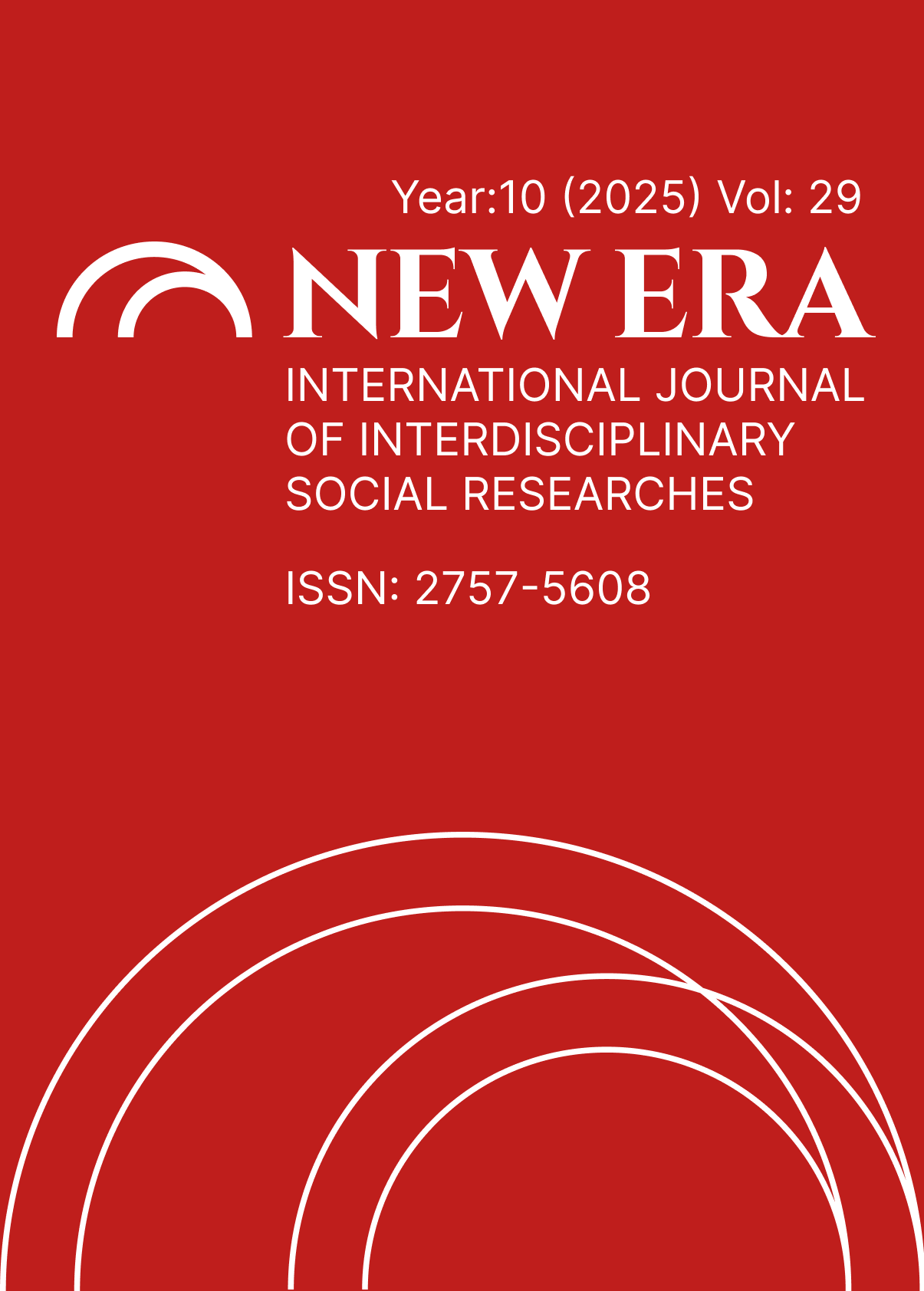METAPHORICAL REPRESENTATIONS OF THE CONCEPT OF INFINITY IN SECONDARY SCHOOL STUDENTS AND PROSPECTIVE TEACHERS
DOI:
https://doi.org/10.5281/zenodo.15737620Keywords:
Infinity, metaphor, prospective teachers, middle school studentsAbstract
In education, metaphors are not merely considered a linguistic approach but also conceptual and cognitive structures. In this context, metaphors are not just linguistic expressions but also have a dimension related to thought and understanding. Given the potential of metaphors to facilitate the comprehension of mental representations of concepts, it is anticipated that they could serve as an effective tool for understanding abstract and complex concepts such as infinity. This study aims to examine the metaphorical images of middle school students and teacher candidates regarding the concept of infinity. Metaphorical images were comparatively analyzed based on educational level and gender. For this purpose, data collected from 488 participants were evaluated. The meaningful data obtained were analyzed within the theoretical framework of conceptual metaphor theory. Participants' written responses were examined in detail in the context of the target domain, the source domain, and the relationship between these two domains. The analysis results reveal that a significant proportion of participants experienced difficulties in the metaphorical reasoning process regarding the concept of infinity. Participants predominantly generated metaphorical images in the emotional-spiritual infinity category, while they produced the least in the mathematical infinity category. Moreover, participants' tendency to explain infinity metaphorically as a potential process aligns with the historical development of the concept of infinity. In light of these findings, it is recommended that metaphorical perceptions of infinity be examined in detail across different age groups, professions, and disciplines.
References
Arıkan, A., & Halıcıoğlu, S. (2012). Soyut matematik. Palme yayıncılık.
Aztekin, S. (2008). Farklı yaş gruplarındaki öğrencilerde yapılanmış sonsuzluk kavramlarının araştırılması. Gazi Üniversitesi Eğitim Bilimleri Enstitüsü, Ankara.
Aztekin, S., Arıkan, A., & Sriraman, B. (2010). The constructs of PhD students about infinity: An application of repertory grids. The Mathematics Enthusiast, 7(1), 149-174. https://doi.org/10.54870/1551-3440.1180
Bozkuş, F. (2014). Ortaokul öğrencilerinin sonsuzluk kavrayışları (Yüksek lisans tezi). Abant İzzet Baysal Üniversitesi, Eğitim Bilimleri Enstitüsü.
Bozkuş, F., Toluk Uçar, Z., & Çetin, İ. (2015). Ortaokul öğrencilerinin sonsuzluğu kavrayışları. Turkish Journal of Computer and Mathematics Education, 6(3), 506-531. https://doi.org/10.16949/turcomat.53890
Çelik, D., & Akşan, E. (2013). Matematik öğretmeni adaylarının sonsuzluk, belirsizlik ve tanımsızlık kavramlarına ilişkin anlamaları. Necatibey Eğitim Fakültesi Elektronik Fen ve Matematik Eğitimi Dergisi, 7(1), 166-190. https://doi.org/10.12973/nefmed158
Danesi, M. (2007). A conceptual metaphor framework for the teaching of mathematics. Studies in philosophy and education, 26, 225-236. https://doi.org/10.1007/s11217-007-9035-5
Ergene, Ö. (2021). Öğretmen adayları gözünden sonsuzluk kavramı ve matematik dersi öğretim programı. YYÜ Eğitim Fakültesi Dergisi, 18(2), 123–151. https://doi.org/10.33711/yyuefd.998263
Genç, F. (2021). Ortaöğretim öğretmenlerinin sonsuzluk algıları (Yüksek lisans tezi). Balıkesir Üniversitesi, Fen Bilimleri Enstitüsü.
Habacı, Ş. D., & Çetin, İ. (2023). Lise öğrencilerinin sonsuzluk kavramına ilişkin metaforları. Kırşehir Eğitim Fakültesi Dergisi, 24(2), 1108-1161.
Hannula, M. S., Pehkonen, E., Maijala, H., & Soro, R. (2006). Levels of students’ understanding on infinity. Teaching Mathematics and Computer Science, 4(2), 317-337. https://doi.org/10.5485/TMCS.2006.0129
İşleyen, T. (2013). Ortaöğretim öğrencilerinin sonsuzluk algıları. Kastamonu Eğitim Dergisi, 21(3), 1235-1252.
Kövecses, Z. (2010). Metaphor: A practical introduction (2nd ed.). Oxford University Press.
Lakoff, G., & Johnson, M. (1980). Metaphors we live by. Chicago: The University of Chicago Press.
Lakoff, G., & Johnson, M. (2015). Metaforlar: Hayat, anlam ve dil (G. Y. Demir, Çev.). İstanbul: İthaki Yayınları.
Mamolo, A. ve Zazkis, R. (2008). Paradoxes as a window to infinity. Research in Mathematics Education, 10 (2), 167-182. https://doi.org/10.1080/14794800802233696
Maria, K., Thanasia, M., Kontoyianni, K., Christou, C., & Philippou, G. (2009). Teachers’ perceptions about infinity: A process or an object? Proceedings of CERME 6, January 28-February 1, 2009, 1771-1773.
Miles, M. B., & Huberman, A. M. (1994). Qualitative data analysis: An expanded sourcebook (2nd ed.). SAGE Publications
Narlı, S., & Narlı, P. (2012). İlköğretim öğrencilerinin sonsuzluk fikrine sahip mi? Buca Eğitim Fakültesi Dergisi, 33, 122–125.
Nesin, A. (2007). Matematik ve sonsuz (1. baskı). İstanbul: Nesin Yayıncılık.
Núñez, R. E. (2005). Creating mathematical infinities: Metaphor, blending, and the beauty of transfinite cardinals. Journal of Pragmatics, 37(10), 1717–1741. https://doi.org/10.1016/J.PRAGMA.2004.09.013
Özmantar, M. F. (2008). Sonsuzluk kavramı: Tarihsel gelişimi, öğrenci zorlukları ve çözüm önerileri. In M. F. Özmantar, E. Bingölbali, & H. Akkoç (Eds.), Matematiksel kavram yanılgıları ve çözüm önerileri (pp. 151-180). Pegem Akademi.
Saban, A. (2009). Öğretmen adaylarının öğrenci kavramına ilişkin sahip oldukları zihinsel imgeler. Türk Eğitim Bilimleri Dergisi, 7(2), 281–326.
Sırmacı, N., & Gökkurt Özdemir, B. (2016). Matematik öğretmenlerinin sonsuzluk, belirsizlik ve tanımsızlık kavramlarına ilişkin öğretimsel açıklamaları. Bartın Üniversitesi Eğitim Fakültesi Dergisi, 5(3), 788–806. https://doi.org/10.14686/buefad.v5i3.5000201306
Tirosh, D. (1999). Finite and infinite sets: Definitions and intuitions. International Journal of Mathematical Education in Science and Technology, 30(3), 341–349. https://doi.org/10.1080/002073999287879
Wikipedia. (2025). Metaphor. In Wikipedia. Retrieved January 13, 2025, from https://en.wikipedia.org/wiki/Metaphor
Yıldırım, A., Şimşek, H. (2011). Sosyal Bilimlerde Nitel Araştırma Yöntemleri. Ankara: Seçkin Yayınevi
Yıldırım, K., & Keşan, C. (2017). Ortaokul öğrencilerinin üç nokta ve sonsuzluk kavramlarına ilişkin görüşleri. Eğitim ve Bilim, 42(191), 103-115.
Downloads
Published
How to Cite
Issue
Section
License
Copyright (c) 2025 NEW ERA INTERNATIONAL JOURNAL OF INTERDISCIPLINARY SOCIAL RESEARCHES

This work is licensed under a Creative Commons Attribution-NonCommercial 4.0 International License.


